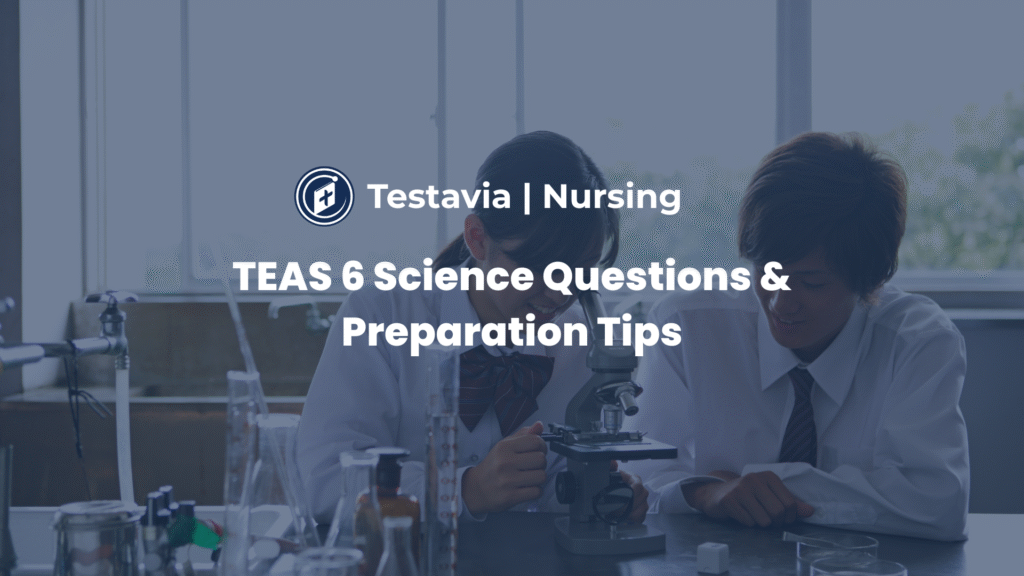
Intro: TEAS Science Questions Preparation Tips
The TEAS Science portion could be an overwhelming task. The test encompasses a broad range of topics, including human anatomy, the life sciences, and scientific reasoning. I know you already know the importance of having a good score.
It’s good news that, with the right training, you’ll be able to enter your test center confidently. This guide will offer practical tips and strategies to aid you in passing the nursing school science section of the TEAS. While we are focusing on science, we must remember that a high overall score is crucial to a successful TEAS. In this case so you must also prepare for other sections, such as the English ATI TEAS test.
Understanding the TEAS 6 Science Questions
The TEAS science section was designed to test your basic understanding of key areas of science.
It is comprised of 53 questions you have to complete within 60 minutes. The material is divided into three categories:
- Human Anatomy and Physiology: This is the biggest part of the science test. It covers the major organ systems of the human body, as well as their roles and how they interact.
- Life and Physical Sciences: This section covers questions about biological sciences , as well as Chemistry and basic Physics.
- Scientific reasoning: These questions will test your ability to comprehend information, comprehend experimental design, and draw logical conclusions from data derived from science.
A good method of getting a feel of the exam format is using the Testavia sample exam. This will allow you to understand the type of questions you’ll encounter and also manage your time efficiently on the day of the test.
Tip 1: Build a Strong Foundation in Anatomy and Physiology
Human Anatomy and Physiology constitute the majority of the Teas science portion, it’s the subject you must focus on the majority of your time studying.
Don’t just remember facts; seek to know how to understand the “why” along with the “how” that each System is built upon.
Key Body Systems to Master:
- The Cardiovascular System: Know the flow of blood, the anatomy of the heart, and the roles of veins and arteries.
- Respiratory System: Be aware of the principles of respiration, gas exchange, and the structure of the lungs.
- Nervous System: Discover more about the brain, the central and. peripheral nervous System, as well as the functions of sensory systems.
- The Endocrine System: The focus is on the glands of the largest size that produce hormones and their role in the regulation of the body.
- Digestive System: Track the route of food and learn about the mechanisms of digestion and absorption.
- The Skeletal and Muscular Systems: Know important bones, different types of joints, and the way muscles contract.
Making flashcards of key terms and diagrams can be extremely useful.
Visualizing the way systems work together can help increase your understanding.
For instance, you can see how the cardiovascular and respiratory systems interact to provide oxygen to the body.
Tip 2: Don’t Neglect Life and Physical Sciences
While anatomy is important, it isn’t wise to avoid chemistry, biology, and Physics. These subjects are certain to be on the test.
- Biology: Learn the basic concepts of cell theory and function, structure, and the process of reproduction (mitosis as well as meiosis).
- Chemistry concentrates on the periodic table, the atomic structure (protons, neutrons, electrons), and chemical bonds, along with pH. There is no need for advanced chemical knowledge, but a firm grasp of the basic concepts is vital.
- Physics Fundamental concepts like force, mass, and energy are a fair game. Learn about the states of matter and basic measures.
These subjects often overlap. For example, understanding the chemical processes is essential to understanding biological processes.
Tip 3: Sharpen Your Scientific Reasoning Skills
The part that tests your scientific reasoning in the TEAS test isn’t about what you’ve learned, but the way you think. It assesses your ability to analyse charts, graphs, and experiments.
How to Improve Your Reasoning:
- Learn to read graphs and tables: Develop the ability to recognize trends, variables, and important data details.
- Understanding the Experimental Design: Learn the difference between a control and an experimental group and distinguish between dependent and independent variables.
- Assess Hypotheses: Test your knowledge of the extent to which a particular collection of data supports or disproves an idea that is scientifically proven.
A lot of students find this part difficult. The best way to learn is to practice regularly. Include the teas at no cost tests in your daily study routine to concentrate on these kinds of questions.
The repeated exposure will teach the brain to think like an expert.
Tip 4: Create a Realistic Study Schedule
One thing to keep in mind, Do not try to memorize everything you have learned in the week leading up to the test.
- Begin early: Give yourself six to eight weeks of study.
- Broken Down: Designate certain days for certain subjects. For instance, Mondays can be dedicated to cardiovascular health, Tuesdays are for biology, and so on.
- Mixing in the Practice Room: Don’t just read. After you’ve learned about a topic, you can find questions that are related to the subject.
- Incorporate Other Subjects: While this guide is focused on science, your schedule must include time for other sections of TEAS. For example, the ATI TEAS math questions or re-reading the grammar of the English ATI TEAS questions.
A balanced approach guarantees you are well-prepared for each aspect that comes with ATI testing. ATI test.
Tip 5: Practice With High-Quality Teas 6 Science Questions
The only way to prepare is through practice. The full-length ATI TEAS test examination in timed conditions is the most effective way to replicate the actual exam experience.
It aids in building the endurance to handle anxiety and pinpoint the weak points.
When you go over your performance, do not just focus on the things you didn’t do. You should ask yourself what the reason was that you did it wrong. Did it have to do with a knowledge gap?
A reading comprehension issue?
Have you run out of time? Reviewing your mistakes is among the most effective methods for studying.
There is a wealth of resources online. These include; free teas tests from ATI testing and Testavia Nursing Resources which is a great place to start. As you approach the date of your test, think about buying premium tests with detailed explanations of each question.
Final Thoughts on Your TEAS Journey
Beating the science section of the TEAS is definitely within reach. Aim at gaining better knowledge of the most important concepts. Understand the scientific method, and implementing a regular schedule of study. Through this, you’ll make yourself a better candidate for success in the future of your nursing career. Keep in mind that determination and wise study habits can make all the difference.
Are you ready to Ace Your TEAS 6 Science Questions?
Head over to our TEAS Study Guide Hub and get access to complete study guides, expert strategies, and top-quality test prep designed to boost your confidence and raise your score.
Begin your nursing journey with the most effective tools. Take a look at the TEAS Science tools right now!
